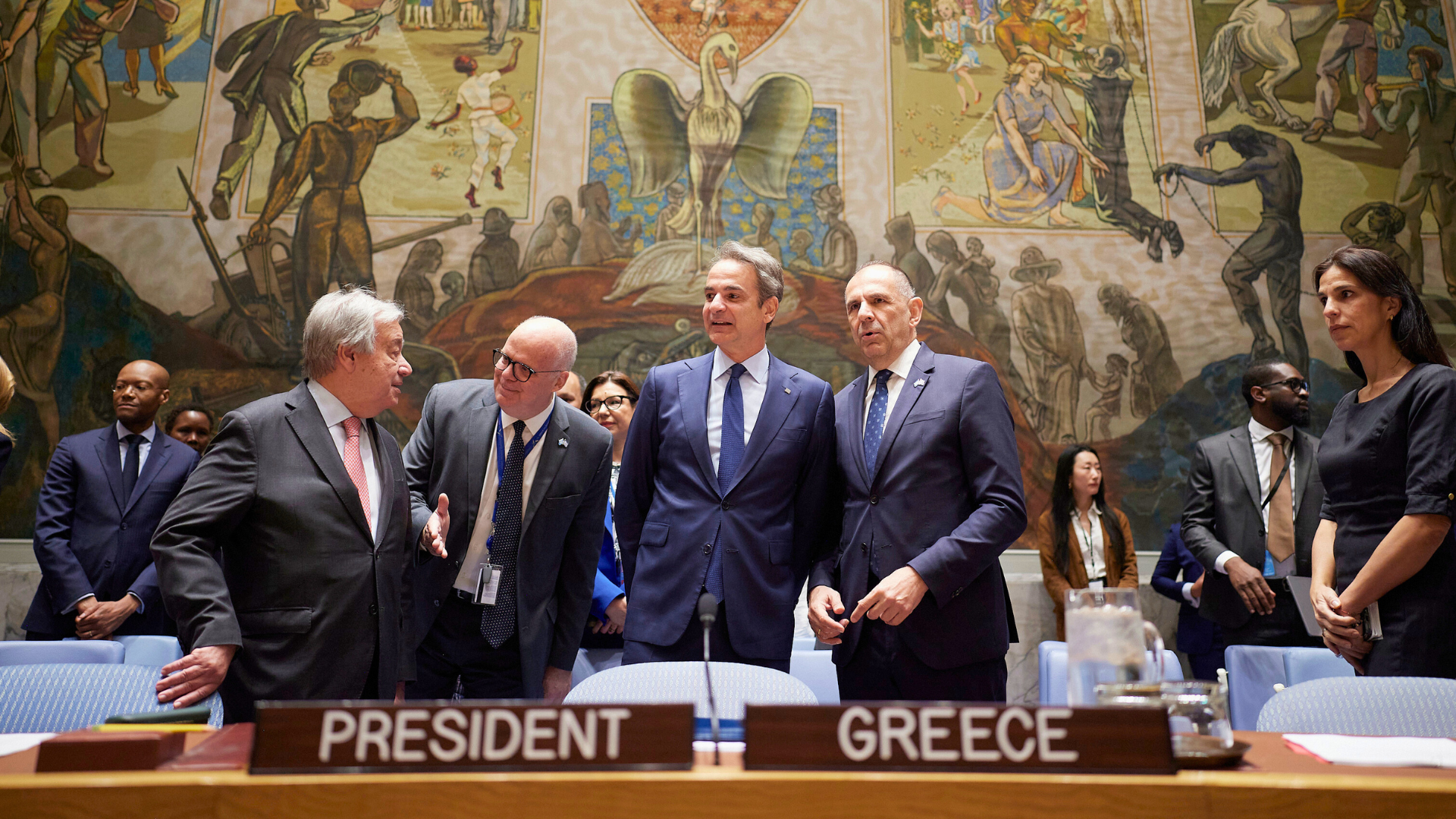Greek Prime Minister Kyriakos Mitsotakis met with United Nations Secretary-General Antonio Guterres at UN headquarters in New York on Tuesday, May 20, to discuss Greece’s priorities for its 2025–2026 term on the UN Security Council and pressing international and regional developments.
The Cyprus issue featured prominently in their discussion. Mitsotakis welcomed the Secretary-General’s efforts to revive peace talks and expressed his support for the reappointment of Maria Angela Holguin Cuellar as Guterres’ personal envoy for Cyprus. He also thanked Guterres for his continuing service.
Regional developments were also reviewed, with a focus on Gaza, Syria, and Lebanon. Mitsotakis stressed the need for “an immediate ceasefire in Gaza, the protection of civilians, and the launch of initiatives to that end.”
Earlier in the day, Mitsotakis addressed the UN Security Council’s high-level open debate on maritime security, reaffirming Greece’s strategic commitment to safeguarding international shipping and global stability.
“The United Nations is at the centre of international efforts to protect and preserve our oceans,” Mitsotakis said, adding that the organisation is the “custodian of the International Convention on the Law of the Sea.”
Ο μόνος τρόπος να αντιμετωπίσουμε τις απειλές θαλάσσιας ασφάλειας είναι μέσω της αποτελεσματικής διεθνούς συνεργασίας. Η Ελλάδα θα παραμείνει «θεματοφύλακας» της ελευθερίας της ναυσιπλοΐας. pic.twitter.com/q5rqdwu460
— Prime Minister GR (@PrimeministerGR) May 20, 2025
He emphasised that over 80% of global trade is carried by sea and that maritime security is essential for “political stability, economic stability – including price stability – sustainable development, and the well-being of all people.”
Mitsotakis cited a growing list of asymmetric maritime threats including “smuggling, terrorism, piracy and hybrid attacks,” and warned that climate change and extreme weather are increasingly disrupting port operations and sea lanes.
Addressing these global threats, he said, requires “effective international cooperation… at the state level, at the level of international organisations, and the private sector.”
He outlined six priorities: enhancing maritime awareness and technology, combating illicit shipping practices, capacity-building, strengthening legal frameworks, addressing environmental risks, and protecting seafarers.
Referring to the recent salvage of the M/V Sounion in the Red Sea, Mitsotakis called it a successful case of averting a major environmental and humanitarian disaster. He also cited Greece’s active role in EU naval operations such as ASPIDES, ATALANTA, and IRINI.
On legal frameworks, he reaffirmed Greece’s support for the UN Convention on the Law of the Sea (UNCLOS) as the foundation for global maritime governance.
Regarding seafarers, he noted their critical role in global trade and the heightened risks they face, adding: “Without them, half of the world would freeze, and half of the world would starve.”
“Maritime security,” Mitsotakis concluded, “is fundamentally connected to the core values of the free world. No one could really enjoy the well-established principles of the freedom of the seas… without the prerequisite of maritime security.”
He pledged Greece’s continued leadership, stating: “Greece will remain the guardian of the freedom of navigation, hand in hand with all UN nations… during our Security Council tenure and beyond.”
Mitsotakis was accompanied by his wife Mareva Grabowski Mitsotakis, his son Konstantinos, Foreign Minister George Gerapetritis, and Greece’s Permanent Representative to the UN, Ambassador Evangelos Sekeris.
